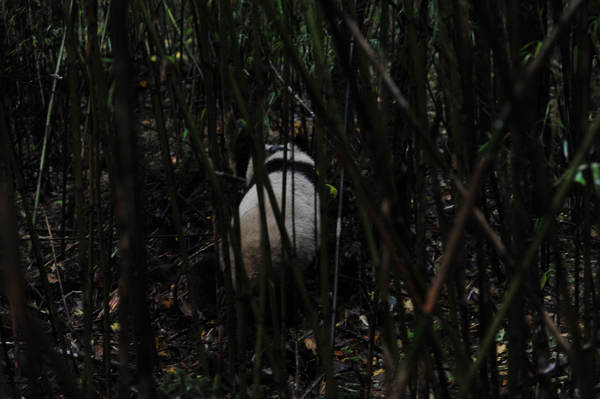Young panda gets a taste of the wild life
 |
|
Artificially bred panda Taotao walks out of its cage to the wild forest at the Lipingzi Nature Reserve in Sichuan province, Oct 11, 2012. [Photo/for China Daily] |
After almost three years, the panda was taken into the mountainous Wuyipeng area of Wolong, home to more than 10 wild pandas.
On Dec 13, 2006, the radio positioning system showed Xiang Xiang had suddenly traveled a long distance, unusual behavior for a panda, which is a sedentary animal. Nine days later, researchers found him with injuries on his back and his hind feet.
After receiving treatment at the base, the animal was re-released on Dec 30.
The radio signal again became weak on Jan 7, 2007, and then stopped. Xiang Xiang's body was found in the woods on Feb 19. He had a broken rib, injuries to his ears and a large wound on his back.
Researchers suspected he had taken refuge in a tree after a fight with wild pandas, but then had fallen to his death.
It was a heavy blow to workers at Wolong whose endeavors to return pandas to the wild were later suspended by the Wenchuan earthquake in May 2008.
The reserve's Hetaoping base was destroyed in the magnitude-8 tremor, which killed more than 69,000 people and left 18,000 missing. Its pandas were relocated to the Bifengxia base in nearby Ya'an.
Liziping, a provincial-level reserve approved by the Sichuan government in 2003, is home to 13 wild pandas, according to the third national panda census in 1999 and 2000. The sparse population reduces the chance of conflict for Tao Tao, Zhang said.
Nicolas Brown, a three-time Emmy Award-winning director from the United States, compared sending Tao Tao into the wild with the moon landing.
"As a representative of captive pandas, Tao Tao will explore the wilderness, which is their original home," said Brown, who was camouflaged to prevent him disturbing the panda during the release ceremony.
Qi Dunwu, a researcher at the Chengdu Research Base of Giant Panda Breeding, said he thinks it will take at least 50 years for captive pandas to succeed in finding their real home.
It requires several steps, he said. First, a panda released to the wild must feed itself. Second, it must protect its own territory and find a partner. Third, it must breed. Fourth, its offspring must also breed.
It will take about three generations for those steps, as the lifespan of a panda is 15 to 30 years, Qi added.
China has attached great importance to the protection of pandas and has established 64 giant panda nature reserves in Sichuan, Shaanxi and Gansu provinces, covering 60 percent of panda habitats and more than 70 percent of the wild panda population.
Currently, more than 1,600 pandas live wild in the country.
huangzhiling@chinadaily.com.cn




















